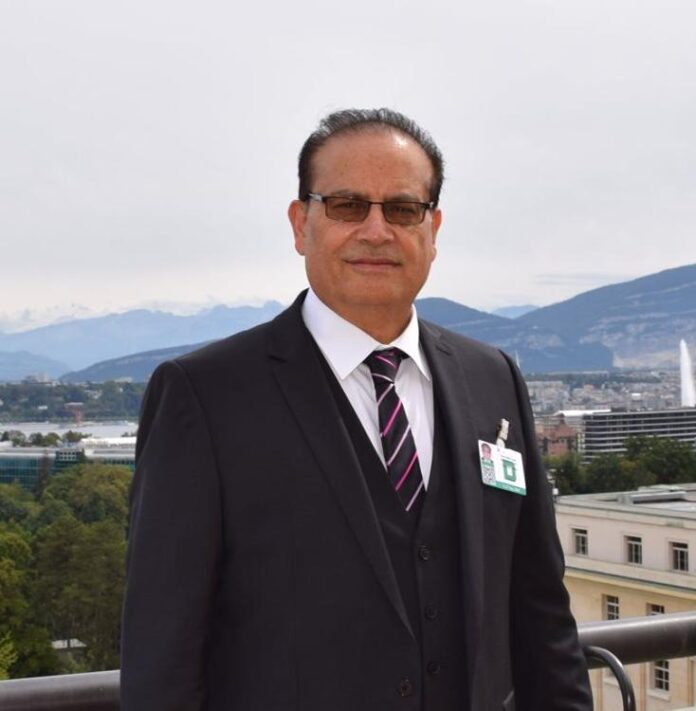By Qamar Bashir
In the crowded halls of diplomacy, where words often drown in endless speeches, moments arise that define not only the speaker but the nation behind him. Such a moment recently came when Pakistan’s Permanent Representative to the United Nations, Ambassador Asim Iftikhar, stood before the world and dismantled Israel’s attempt to misuse Pakistan’s sacrifices in the fight against terrorism to justify its indiscriminate assault on Gaza. His intervention not only forced an unprecedented apology from Israel’s ambassador, Danny Danon, but also reaffirmed Pakistan’s moral authority as the voice of conscience for the Muslim world and for oppressed people everywhere.
For me, this triumph was not just a matter of national pride but also personal reflection. Two years ago, while waiting for an audience with President Arif Alvi in Islamabad, I met Ambassador Asim Iftikhar as he prepared to assume his responsibilities as Pakistan’s envoy to France. In those quiet minutes, I found him to be articulate, deeply thoughtful, and radiating professionalism. There was in his demeanor a rare blend of intellectual precision and quiet confidence, qualities that I felt would take him far in representing Pakistan. That impression, formed in the corridors of the presidency, has since been vindicated in the most remarkable way, culminating in his recent performance at the United Nations where he shone not only as Pakistan’s voice but as the spokesperson of the Muslim world.
The confrontation that revealed his strength of character unfolded when the Israeli ambassador attempted to draw an analogy between Israel’s bombardment of Gaza and the U.S. operation in Abbottabad, Pakistan, which killed Osama bin Laden. It was a deliberate distortion, intended to cloak genocide in the language of counterterrorism, and it invoked Pakistan’s history in a way that was both misleading and offensive. Ambassador Iftikhar rose with words that pierced the façade. He reminded the world that Pakistan had been a frontline state in the global fight against terrorism, losing more than seventy thousand men, women, and children, dismantling terror networks, and rendering sacrifices unmatched by any other nation. “Pakistan’s record,” he declared, “is bright, recognized worldwide, and written in the blood of its martyrs.” He then turned the analogy on its head, pointing out with clarity that invoking Pakistan’s sacrifices to justify the mass killing of innocents in Gaza was “outrageous, incoherent, and morally indefensible,” for what Israel was doing was not counterterrorism but genocide, ethnic cleansing, and the conversion of Gaza into a slaughterhouse.
The chamber fell silent. Rarely does rhetoric give way to truth so powerfully, and rarely is propaganda so effectively exposed. The weight of his words left Israel’s representative cornered, and in a rare act of contrition, Danny Danon publicly apologized to Pakistan, admitting that invoking its name had been inappropriate. It was more than a diplomatic win; it was a narrative triumph, a moment where Pakistan’s honor was defended, its sacrifices acknowledged, and Israel’s distortion dismantled. For Pakistan, it was a reminder of the power of words when spoken with conviction, and for the Muslim world, it was proof that a principled voice could still rise above the noise of power politics.
This intervention was not an isolated act but part of a larger continuum of Ambassador Iftikhar’s work. Again and again at the United Nations, he has projected the suffering of Gaza and the West Bank with unflinching clarity. In June this year, he declared before the General Assembly that “the situation in Gaza is a stain on our collective conscience. Over fifty-five thousand lives have been lost, including eighteen thousand children and twenty-eight thousand women. Infrastructure has been razed—homes, hospitals, schools, cultural heritage, places of worship. Famine looms. Humanitarian workers and UN personnel are being attacked with impunity. This is not just a humanitarian catastrophe; it is a collapse of humanity.” These were not the words of a man speaking only for Pakistan. They were the words of a diplomat mobilizing the conscience of the world, urging not only the Muslim community but all of civilization to act, to recognize that without justice there can be no peace. He has repeatedly called for the only viable solution: the realization of a two-state solution on pre-1967 borders, with Al-Quds Al-Sharif as the capital of a sovereign, independent, and contiguous State of Palestine.
By vividly describing demolished schools, destroyed hospitals, displaced families, starving children, and the blockade of humanitarian aid, he has carried the Palestinian tragedy from the rubble of Gaza to the chambers of the United Nations, where it cannot be ignored. He has mobilized not just the Muslim world but also neutral states, civil society, and even hesitant Western capitals to rethink their silence. His interventions have contributed to the momentum behind resolutions in the General Assembly, including Pakistan’s pivotal role in the historic vote affirming the two-state solution, a success story of multilateral diplomacy where Pakistan once again played a leading role.
His diplomacy is marked by dignity. In confronting Israel, he did not descend into anger or hyperbole. Instead, he marshaled facts, invoked moral clarity, and exposed propaganda with surgical precision. He reminded the world that the fight against terrorism cannot be equated with the slaughter of innocent civilians, and in doing so, he not only defended Pakistan’s honor but also gave voice to the millions of Palestinians trapped under bombardment and occupation. His words carried the weight of truth, and truth compelled even Israel, often shielded by its allies, to apologize.
This was Pakistan at its finest—firm, dignified, principled. It was not just defending its own history but championing the cause of justice for Palestine, exposing tyranny, and mobilizing the conscience of the world. For me, watching this unfold brought back that first impression I had of him in Islamabad, a man destined to leave his mark. He has not only fulfilled that promise but exceeded it, standing tall as a diplomat whose words moved nations and whose voice gave hope to the oppressed.
The United Nations may often be a theater of speeches with little consequence, but sometimes, words alter the moral landscape. Through Ambassador Asim Iftikhar, Pakistan has shown that truth, when spoken with conviction, can silence distortion, compel apologies, and remind the world that dignity and justice still matter. In that chamber, Pakistan’s voice was heard and respected. It was the voice of a nation that has suffered and sacrificed, yet continues to stand for justice—not only for itself but for all oppressed peoples. And in that moment, Pakistan reminded the world that diplomacy, at its best, is not about power but about conscience, and that conscience, when articulated with courage, can still shake the foundations of injustice.
Press Secretary to the President (Rtd)
Former Press Minister, Embassy of Pakistan to France
Former Press Attache to Malaysia
Former MD, SRBC | Macomb, Michigan, USA

















